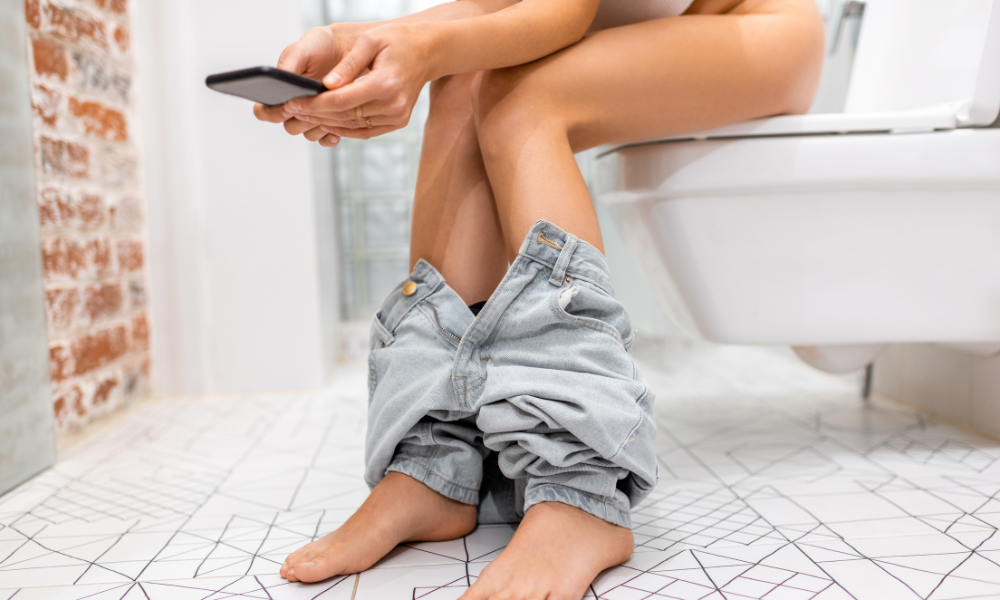If you find yourself feeling like you have to pee a lot before or during your period, know that you’re not alone. For the most part, this is a normal menstrual symptom (as annoying as it may be) caused by spikes and dips in progesterone levels toward the end of your cycle. While taking certain steps can help reduce the frequency and intensity, you should talk to your doctor about how to stop frequent urination during your period if your symptoms become unmanageable or disrupt your daily life.
Causes of frequent urination before menstruation
During your menstrual cycle, your body produces progesterone, a hormone responsible for retaining fluid needed to support the placenta during pregnancy. When your period starts, progesterone levels return to normal (although fluid levels remain high) - this is why many women experience bloating during PMS. Frequent urination is your body's natural way of flushing out excess fluid.
In some cases, frequent urination before or during your period can be a symptom of a urinary tract infection (UTI) or overactive bladder. While most UTIs can be treated with antifungal or antibiotic medications, overactive bladder can be caused by nerve damage, age, lifestyle factors, or changes that come with age. In rare cases, these symptoms can indicate a kidney infection. Contact your doctor if your symptoms feel unusually severe or bothersome.
Symptoms of frequent urination before menstruation
For many women, it can be difficult to determine whether frequent urination is a symptom of PMS or early pregnancy. In both cases, you may experience headaches, changes in appetite, bloating, cramps, and mood swings. You may experience the following (completely normal) symptoms:
- Going to the toilet 2 to 3 times a day more often than normal
- Sudden, sudden urge to urinate
- Weight changes and bloating (water weight)
A urinary tract infection can also cause frequent urination. If you have a burning sensation when you urinate, discolored or strong-smelling urine, blood in your urine, or if you wake up at night to go to the bathroom, you probably have a urinary tract infection. Take antifungals or antibiotics and if your symptoms don’t improve after a day or two, make an appointment with your doctor. If you see blood in your urine and feel pain in your back or lower abdomen, call your doctor or an emergency medical hotline as soon as possible, as these symptoms could indicate a kidney infection. Untreated kidney infections can lead to sepsis, a life-threatening condition.
Solutions for frequent urination before and during menstruation
While everyone is different and hormonal variation can be affected by everything from diet to stress levels, the following steps can help manage the need to urinate frequently before and during your period.
Track your cycle
Knowing what to expect (and when) can help you anticipate frequent urination before and during your period. By far the easiest method for scheduling your period is to write down your start and end dates on a small calendar (and keep it in your purse). From the day you first start bleeding, a period typically lasts 3-5 days, but can last 7-10 days. The length of a menstrual cycle can vary, but the average is 28 days. For those who prefer to go paperless and keep track of everything digitally, there are apps like Period Calendar and Eve that help you schedule and manage your period symptoms by incorporating real-time input including mood, sexual activity, and other factors.
Pay attention to your fluid intake
Staying hydrated before and during your menstrual cycle can help with headaches, fatigue, constipation, and other uncomfortable PMS symptoms. Drink 8-10 glasses of water daily to flush out excess salts and keep your body healthy. As strange as it may sound, staying hydrated before your period can even prevent water retention, which can help you urinate less often.
Just keep in mind that caffeine and alcohol are not your friends. Both are diuretics and make you pee more often than necessary. You will thank yourself for drinking less for a few days before and during your period.
Strengthening Pelvic Floor Muscles with Kegel Exercises
Kegels not only improve your overall pelvic health and promote better support for your back and hips, they also strengthen your pelvic floor muscles (the muscles around your vagina, pelvis, and anus) to help prevent incontinence and frequent urination. Kegels can be done anywhere - discreetly - but don't overdo it. Limit Kegels during urination (for incontinence management) to twice a month to avoid damaging your bladder or kidneys. Talk to your doctor before adding Kegels to your routine, as Kegels can worsen some forms of pelvic floor dysfunction.
Conclusion
Having to urinate frequently is a very normal symptom of your menstrual cycle.
Because progesterone levels peak and fall, your body releases excess fluid when your period begins.
Peeing a few times a day is perfectly normal before or during your period. Watch for signs of a urine infection or kidney infection, as these can be dangerous if left untreated.
Have a system in place to track and plan your cycle, and limit your intake of diuretics like caffeine and alcohol towards the end of your cycle. Do Kegel exercises to strengthen your pelvic floor, and keep Nexwear on hand as a backup.



















